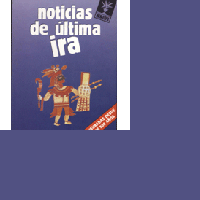03 - Tripulación carabelas
|de caravelles
Crew|caravels
03 - Besatzung der Karavelle
03 - Caravel crew
03 - L'équipage de la Caravelle
03 - Załoga karaweli
03 - Tripulação da caravela
CAP.-03 PALOS DE MOGUER - ESPAÑA
|sticks||Moguer|
LOCUTOR — ¡Cable urgente de última hora!
||urgent|||
¡Cristóbal Colón y sus tres carabelas a punto ya de zarpar!
||||||||||partir en mer
|||||caravels||point|||to set sail
Cuenta atrás para los barcos anclados en el puerto andaluz de Palos de Moguer.
Countdown|back|||boats|anchored||||Andalusian||||
Countdown for the boats anchored in the Andalusian port of Palos de Moguer.
¡Y hacia allá van nuestros
Et||||
And that's where our
micrófonos!
microphones
REPORTERO — Señoras y señores, aquí en el muelle todo es movimiento, acción, agitación ¡expectación!
REPORTER|||||||dock||||||
REPORTER - Ladies and gentlemen, here on the dock everything is movement, action, agitation, anticipation!
En estos mismos momentos, oficiales y marineros están abordando los barcos que les conducirán a la mar desconocida.
||||||||boarding|||||they will lead||||unknown
El bullicio es contagioso.
|le bruit||contagieux
|hustle||contagious
The bustle is contagious.
El puerto de Palos hierve de entusiasmo esperando la hora en que se leven anclas... Veamos algunas opiniones del público aquí presente.
||||bouillonne||||||en|||||||||||
||||boils|||||||||lift|anchors|||||||
The port of Palos is boiling with enthusiasm, waiting for the time when anchors are lifted ... Let's see some opinions of the public here present.
Señora, señora, por favor, dígame... ¿Conoce usted a alguno de los insignes marineros que acompañan a don Cristóbal Colón en este arriesgado viaje?
|||||||||||famous|||accompany|||||||risky|journey
Madam, Madam, please tell me ... Do you know any of the distinguished sailors who accompany Don Cristóbal Colón on this risky journey?
ESPAÑOLA — ¿Que si conozco?
¡Pues claro que conozco!...
¡Conozco a Pedreta el Manco, que le sacó el mondongo a mi cuñado!
|||||qui||a enlevé||ventre|||beau-frère
||Pedreta|||||took out||tripe|||brother-in-law
I know Pedreta el Manco, who took the tripe from my brother-in-law!
REPORTERO — ¿Cómo que le sacó...?
ESPAÑOLA — Pues sí, ¡entero se lo sacó con un puñal de este porte!
|||entierro||||||couteau de poche|||
|||whole||||||dagger|||size
SPANISH - Well, yes, he took it all out with a dagger of this size!
REPORTERO — Bueno, y usted, caballero, ¿podría decirnos algo de la carrera naval de alguno de los oficiales?
||||gentleman|||||||naval|||||
REPORTER - Well, and you, gentleman, could you tell us something about the naval career of any of the officers?
ESPAÑOL — Yo lo que podría decirle es que la mitad de los que van en esos barcos sólo han pegado carrera delante de la policía.
||||||||||||||||||ont||||||
|||||||||||||||||||caught|run|in front of|||
SPANISH - What I could tell you is that half of those who go on those boats have only had a career in front of the police.
¡Si son todos unos delincuentes!
They are all criminals!
REPORTERO — ¡Estimada audiencia, en estos momentos está subiendo el resto de la marinería entre saludos y pañuelos al viento!...
|||||||montant|||||||||des mouchoirs||
|Dear|||||||||||||||flags||
REPORTER — Dear audience, at this moment the rest of the crew is coming up amid greetings and handkerchiefs in the wind!...
Usted, señora, ¿algún mensaje de despedida para los que hoy parten?
|||||de départ|||||
You, madam, any farewell message for those who are departing today?
ESPAÑOLA — Pues sí, el mensaje es que se vayan y que no vuelvan.
|||||est|||||||
SPANISH — Well, yes, the message is that they should leave and not come back.
Oiga, ¡que los tipos esos van llenos de gonorrea!
Écoutez|que|||||||
|||guys|||||gonorrhea
Hey, those guys are filled with gonorrhea!
ESPAÑOL — ¡Sifilíticos!
|Syphilitic
SPANISH — Syphilitics!
ESPAÑOLA — ¡Sinvergüenzas!
|Sans vergogne
|Shameless
SPANISH - Scoundrels!
REPORTERO — ¡Corten, corten!
||Cut
REPORTER - Cut, cut!
Devolvemos nuestros micrófonos a la cabina central!
Nous retournons||||||
We return||||||
We return our microphones to the central booth!
INTERLOCUTOR — Acompañando a Colón en su primer viaje, iban 90 hombres.
INTERLOCUTOR — Accompanying Columbus on his first voyage were 90 men.
La mayoría de ellos eran presos sacados de las cárceles de Andalucía y embarcados a la fuerza.
|||eux|||||||||||||
|||||prisoners|taken|||prisons|||||||
Most of them were prisoners taken from the jails of Andalusia and forced to board.
En los otros viajes, vinieron miles y fue lo mismo: maleantes, vagabundos, aventureros...Desde hace 500 años nos invitan a recibirlos con aplausos.
||||||||||malfaiteurs|||||||||||
||||||||||thugs||adventurers|||||invite||receive them||applause
On the other voyages, thousands came and it was the same: criminals, vagrants, adventurers... For 500 years they have been inviting us to welcome them with applause.
Tal vez la historia esté al revés.
peut-être|||||à|
||||||backwards
Maybe the story is the other way around.

